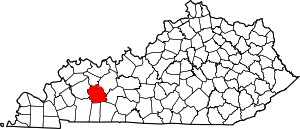Paradise, Kentucky
Paradise was a small town in Muhlenberg County, Kentucky, United States. The town was located 10.5 miles (16.9 km) east-north-east of Greenville and was formerly called Stom's Landing (sometimes incorrectly spelled Stum).[1][2] It was once a trading post along the Green River, but it no longer exists. It was torn down in 1967 by the Tennessee Valley Authority due to health concerns over its proximity to a nearby coal-burning electric plant, Paradise Fossil Plant.

History
Paradise was settled in the early nineteenth century when it was known as Stom's Landing, for Leonard Stom who founded the ferry there.[1][3] It may have once been named Monterey. The origin of its final name of Paradise is not known.[4] It is postulated the name was descriptive, for settlers who considered the setting to be paradise.[5] A post office was established at Paradise on March 1, 1852; it closed in 1967.[2][6]
In 1959, the TVA built a coal plant at the former site of Paradise.[7] The coal-fired plants remain controversial and the Paradise permits in particular, have been criticized by environmentalists for non-compliance with the Clean Air Act.[8] Since construction of new scrubbers on Unit 3 at Paradise, the plant's emissions from the massive unit have dropped dramatically in recent years; this in turn has led to a dramatic drop in toxic emissions from the plant overall.
John Prine
A song about Paradise, Kentucky, called "Paradise", was written and made famous by singer/songwriter John Prine. The lyrics attribute the destruction of Paradise to the Peabody company, referring to the fact that the town was a site for strip mining. The town continued to exist in partial form after the Pittsburg & Midway Coal Company and Peabody Coal Company [9] stripped the coal around it. The Paradise Fossil Plant was initially erected with only two units; afterwards, the residents who were left in the village were bought out by the Tennessee Valley Authority after ash fall from the newly opened plant brought health concerns to the area. Soon after the TVA bought the town out, they tore down all the structures and constructed the largest cyclonic fired boiler in the world at the new "Paradise Unit 3". All that remains of the original town is a small cemetery at the top of a hill close to the plant. The town was never abandoned due to flooding by the Green River. Though the town did endure numerous floods during its lifespan, it survived all the floods of its history.
Numerous cover versions of the song have been recorded.
References
- Paradise in Kentucky KYGenWeb Archived 2015-08-22 at the Wayback Machine
- Rennick, Robert M. (1984) Kentucky Place Names, p. 226. Lexington, Ky: The University Press of Kentucky, ISBN 0-8131-1503-5
- Muhlenberg County Court Order Book 1 Pages 26-50 KyGenWeb Archived 2011-07-23 at the Wayback Machine
- Kentucky Atlas & Gazetteer The University of Kentucky. Accessed online September 2, 2009
- Anderson, Bobby (September 19, 2007). "Sandy Called These Names". Leader-News. pp. A12. Retrieved 16 May 2015.
- Progress Closing the Gates to Paradise KyGenWeb Archived 2015-05-19 at the Wayback Machine
- State History Timeline from Thingstodo.com
- TVA's Kentucky "Paradise" Coal-fired Plant Operating Permit Fails to Comply With the Clean Air Act- August 24, 2009 from The Center for Biological Diversity
- http://mines.findthedata.com/l/17695/Sinclair-Strip-Mine
External links
- Ancestors of Robert Stom & Christine (Hilton) Stom
- Photos of old Paradise
- A pictorial trip to John Prine's Paradise KY - links up old photos of the town to each line of the lyrics
- An up-to-date picture of the TVA Paradise Fossil Plant- This plant is the second largest coal-fired plant in the Tennessee Valley Authority (TVA), rated at 2,558 megawatts at Winter Peak.
